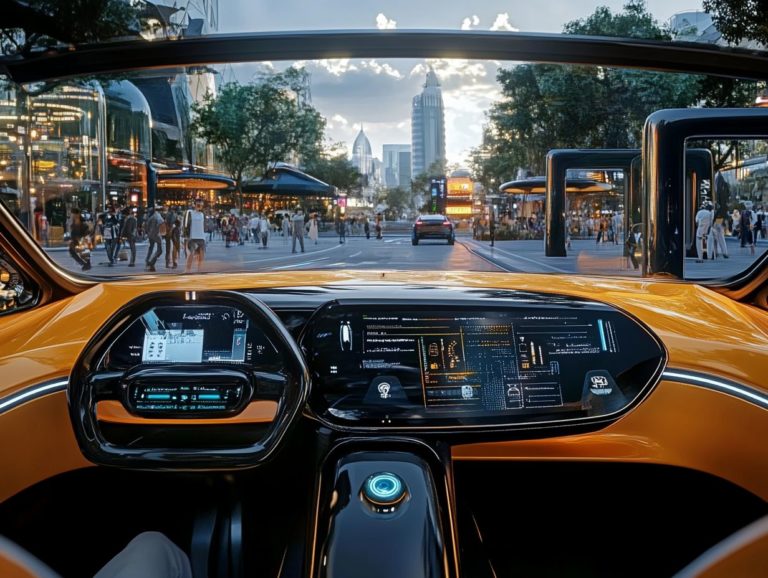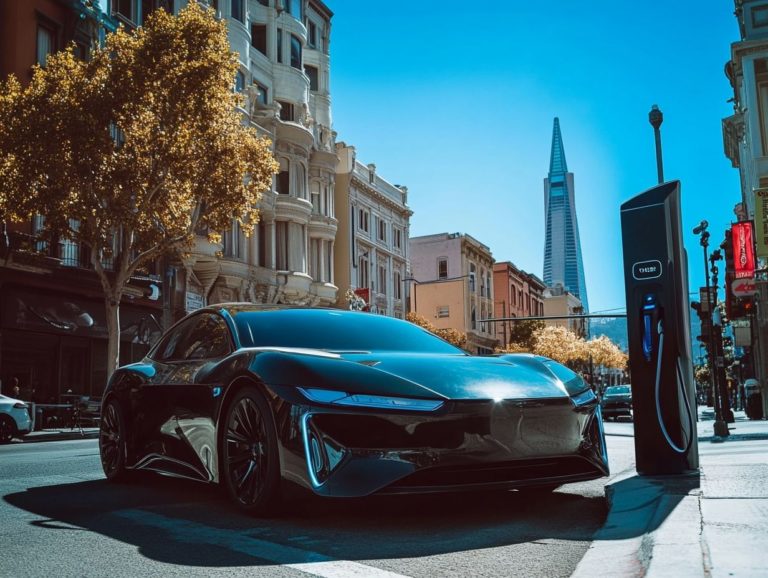53. 7 key features to look for in an electric car
As electric cars continue to gain momentum in the automotive landscape, you may find yourself sifting through numerous options and features. Understanding what to prioritize is essential for making a well-informed decision.
This guide delves into seven key features that can profoundly influence your driving experience:
- Range
- Battery Life
- Performance
- Safety
- Technology
- Comfort
- Cost
Whether you re embarking on your first purchase or seeking to upgrade, this information will empower you to pinpoint the essential characteristics that truly matter when selecting your next electric car.
Contents
- Key Takeaways:
- 1. Range
- 2. Battery Life and Charging
- 3. Performance and Power
- 4. Safety Features
- 5. Technology and Connectivity
- 6. Comfort and Convenience
- 7. Cost and Affordability
- What Are the Benefits of Owning an Electric Car?
- What Are the Different Types of Electric Cars Available?
- How Can One Determine the Right Range for Their Needs?
- What Factors Affect the Battery Life and Charging Time of an Electric Car?
- What Are the Most Important Safety Features to Look for in an Electric Car?
- How Does the Technology and Connectivity of Electric Cars Compare to Traditional Cars?
- What Are Some Comfort and Convenience Features to Consider in an Electric Car?
- Is the Cost of an Electric Car Worth It in the Long Run?
Key Takeaways:

Consider your daily driving needs to determine the right range for your electric car. Research battery life and charging capabilities of different electric cars to find the best fit for your lifestyle. Look for safety features such as automatic emergency braking and blind spot detection when considering an electric car.
1. Range
Range is an important part of electric vehicles that influences your driving experience. It dictates the distance you can travel on a single charge and varies significantly between models like the Tesla Model 3 and the Nissan Leaf, which are notable in the long-range electric car market.
An electric vehicle with an impressive range can ease your range anxiety and grant you the freedom to plan your routes more flexibly. You can effortlessly incorporate errands or spontaneous trips into your day without a second thought.
The Nissan Leaf usually provides a lower range compared to the Tesla Model 3, which boasts the ability to travel over 350 miles on a single charge. This enhanced capacity not only elevates your driving experience but also makes the Model 3 an appealing choice for frequent road trips.
Each model’s distinct performance capabilities cater to various lifestyles, shaping how you perceive convenience and reliability in electric vehicles.
2. Battery Life and Charging
Battery life and charging are crucial for your electric vehicle ownership experience. Battery technology is constantly evolving, and charging infrastructure is expanding, including public chargers and fast charging stations. This directly impacts your battery performance and the ease of recharging.
With batteries designed for longer lifespans, you’ll find yourself needing fewer replacements, which translates to meaningful savings over time. Convenient charging locations whether in urban centers, along highways, or even at home add to the practicality of driving electric.
Recent advancements in battery design have slashed charging times and boosted energy density, offering a more efficient driving range. This integration of technology and infrastructure streamlines your transition to electric vehicles and instills greater confidence in your decision to go electric.
3. Performance and Power
Electric vehicles, like the Tesla Model 3 and Ford F-150, showcase remarkable performance, boasting advanced electric motors that often rival traditional gasoline engines in efficiency and acceleration. These electric motors provide instant torque, which refers to the force that causes rotation, and allows for rapid acceleration that can leave many hybrid and conventional vehicles behind.
Fully electric models maximize energy usage by harnessing nearly all battery power for motion, offering a smoother driving experience. The lower center of gravity in electric vehicles enhances handling, allowing for tighter cornering and superior control.
Ultimately, whether you re navigating bustling city streets or cruising down the highway, the exhilarating power and agility of electric motors elevate your driving experience to extraordinary new heights.
As you evaluate your options, consider how these features can transform your driving experience, making it more enjoyable and convenient.
4. Safety Features
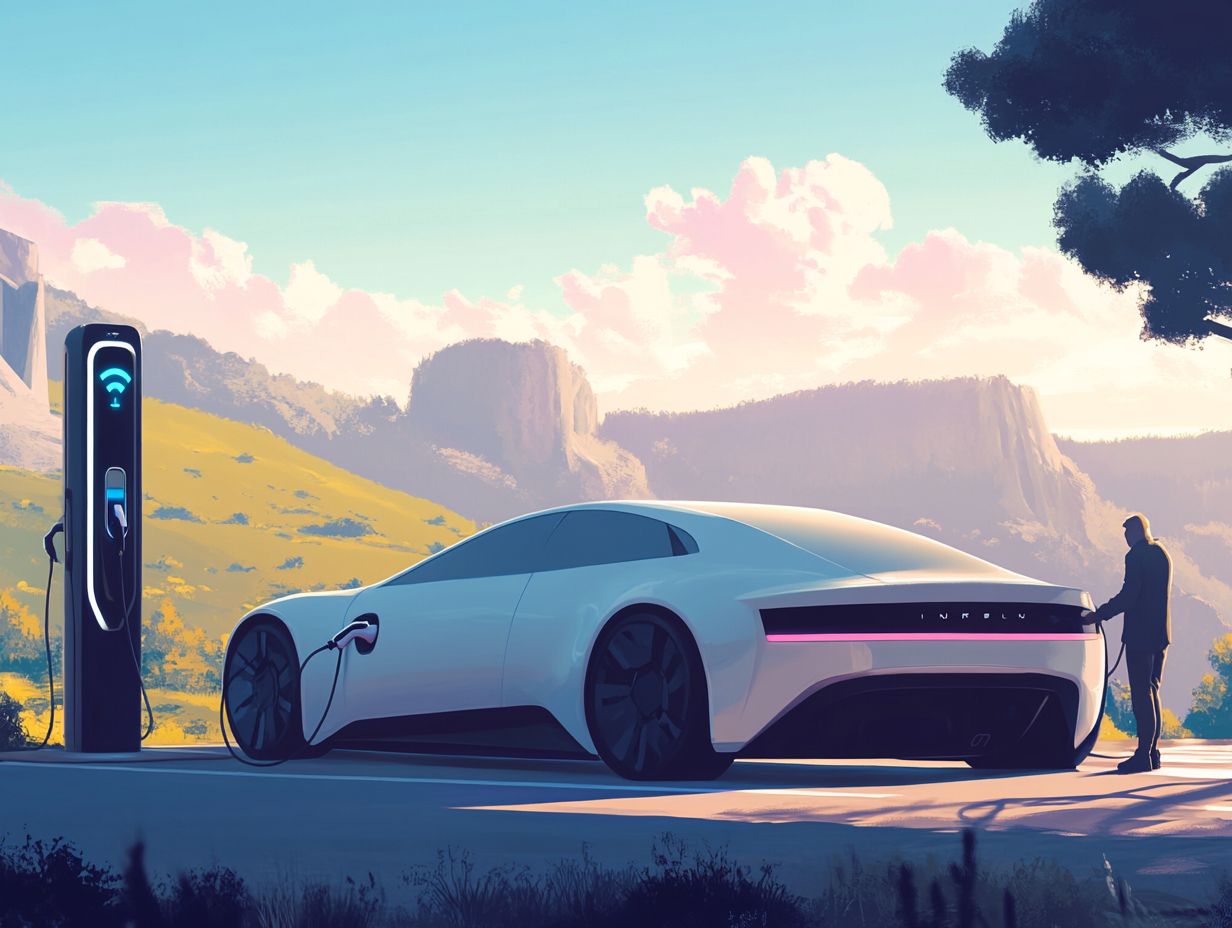
Safety features in electric cars are crucial, especially those assessed by the National Highway Traffic Safety Administration and the Insurance Institute for Highway Safety.
These vehicles often incorporate advanced driver assistance systems designed to elevate overall safety and protect you, the occupant. These systems include:
- A system that automatically adjusts your speed to match the car in front of you.
- Lane-keeping assistance, which helps you stay in your lane.
- Collision avoidance technology to prevent accidents.
All of these systems work in harmony to minimize accidents and bolster your confidence behind the wheel.
Take the Tesla Model 3, for example. It boasts a comprehensive suite of tools like Autopilot. This system aids in steering and acceleration while keeping a vigilant eye on surrounding traffic conditions.
Similarly, the Toyota RAV4 comes equipped with Toyota Safety Sense, which features pre-collision systems and dynamic radar cruise control. These tools actively help reduce potential road hazards.
Together, these groundbreaking innovations are revolutionizing safety ratings and setting new standards within the automotive industry, ensuring that you can drive with peace of mind.
5. Technology and Connectivity
The integration of technology and connectivity in electric vehicles significantly enhances your driving experience. With features like real-time driver feedback, these vehicles align perfectly with sustainability initiatives.
These advancements streamline your journey and foster a more environmentally conscious mindset. Sophisticated infotainment systems grant you seamless access to navigation, music, and essential vehicle information, allowing you to focus on the road while remaining effortlessly connected.
Real-time feedback mechanisms continuously inform you about your driving habits, giving you the power to adjust your behavior for improved energy efficiency. Shifting to sustainable materials in vehicle design shows that innovation can work well with eco-friendly practices, ultimately reducing your carbon footprint without sacrificing performance or comfort.
6. Comfort and Convenience
Comfort and convenience are essential elements of electric vehicles. They offer features that elevate your driving experience while minimizing maintenance and accommodating diverse driving styles.
These vehicles often boast plush seating options with exceptional lumbar support, ensuring you can embark on long journeys without discomfort.
The cabin technology plays a pivotal role, showcasing intuitive interfaces that keep you connected. Advanced climate control systems maintain the perfect temperature, swiftly adapting to any external changes.
These comforts not only enhance your driving experience but also reduce wear and tear, which is advantageous for upkeep. As a result, these features enhance the vehicle’s appeal when it s time to resell, making it a wise investment in both your quality of life and financial future.
7. Cost and Affordability
The cost and affordability of electric cars hinge on various factors, including ownership costs, available government incentives, and the long-term advantages of reduced energy consumption.
When evaluating total ownership costs, it s essential to consider the initial purchase price, which can be steeper for electric models. However, potential rebates and tax credits from local governments can significantly alleviate that upfront financial burden.
Long-term savings on fuel expenses play a crucial role in overall affordability, as electric vehicles typically cost less to operate over their lifetime. Maintenance costs also tend to be lower since they have fewer moving parts compared to internal combustion engines.
Resale value is another key consideration. As the electric vehicle market continues to evolve, many owners may discover that the higher resale prices enhance their financial appeal, further validating their investment.
Explore electric options today and see how they can save you money!
What Are the Benefits of Owning an Electric Car?
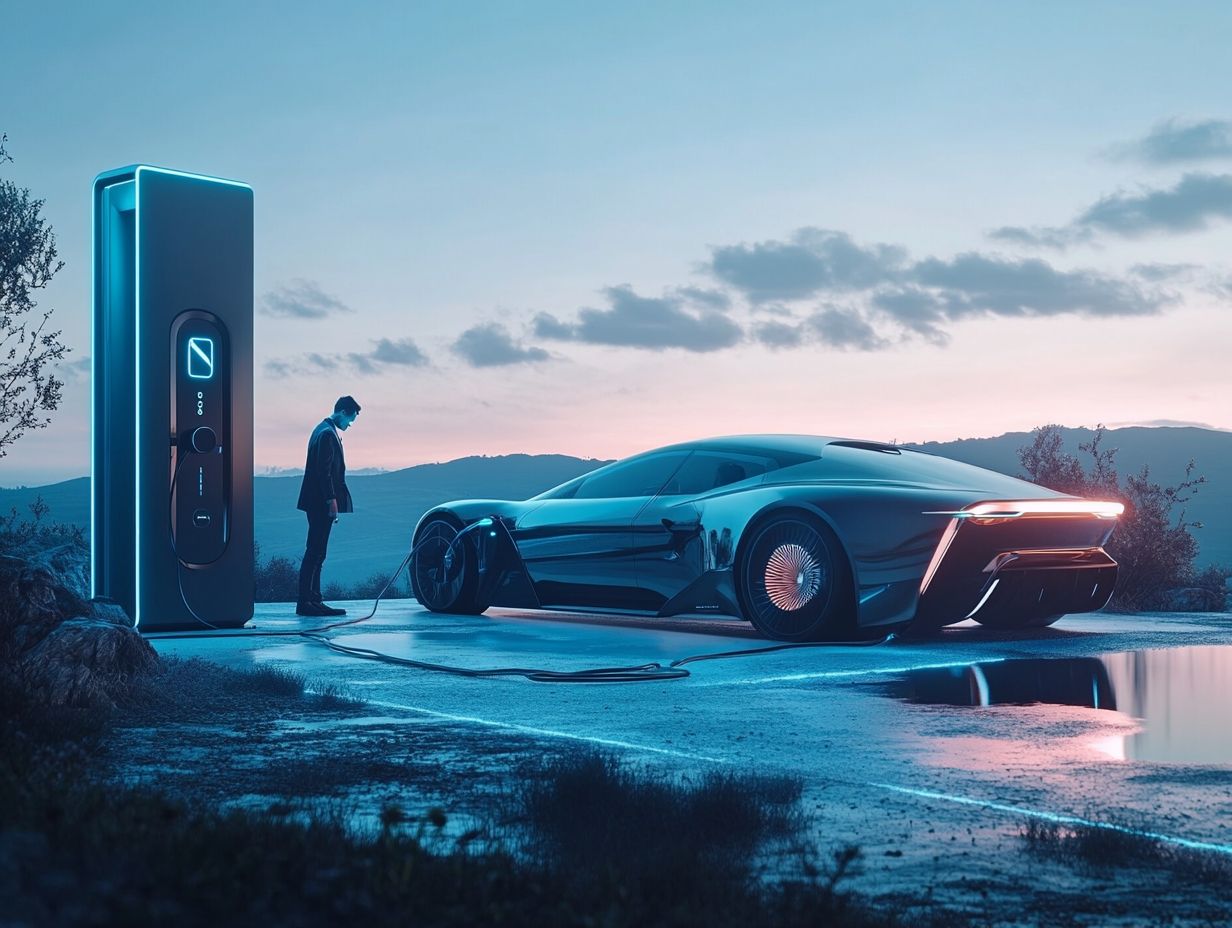
Owning an electric car brings a wealth of benefits your way. You ll enjoy reduced emissions and a lower environmental impact. These zero-emission vehicles champion sustainability while delivering impressive fuel efficiency compared to traditional gasoline engines.
Beyond the environmental advantages, you stand to reap significant financial savings over time. With the cost of electricity generally lower than gasoline, your trips to the pump will become less frequent. Maintenance costs usually dip too, thanks to fewer moving parts and no need for engine oil changes.
In many regions, you can also take advantage of taxes and rebates on electric vehicle purchases. This makes models like the Tesla Model 3 and Nissan Leaf even more enticing. These incentives enhance the value of electric cars, making them a great choice for anyone eager to save money while helping the planet.
What Are the Different Types of Electric Cars Available?
The market presents an impressive array of electric vehicles. You can choose from fully electric options like the Tesla Model 3 and Nissan Leaf or hybrids such as the Toyota RAV4, catering to your diverse preferences and driving needs.
Fully electric vehicles (EVs) run exclusively on electric power. They re perfect for those who want to reduce their carbon footprint while enjoying lower operating costs. If you prefer flexibility, hybrid cars use both electric power and gasoline, offering the best of both worlds.
Among the hybrid options, the Honda Accord Hybrid stands out with its spacious interior and impressive fuel efficiency, making it a popular choice for families and commuters alike.
Each type of vehicle serves different lifestyle needs, ensuring you can find the electric option that perfectly aligns with your requirements.
How Can One Determine the Right Range for Their Needs?
Determining the right range for your electric vehicle depends on several factors. Consider your driving habits, daily commutes, and the availability of charging stations. If you love to travel far, long-range models are your best bet!
For example, if your daily commute is around 30 miles, a model with a range of about 150 miles could be just what you need. It will effortlessly accommodate your daily drives and those occasional weekend excursions.
However, if your daily route stretches to 60 miles or if you frequently embark on road trips, you might want a vehicle boasting a range that exceeds 250 miles. Models like the Tesla Model 3 and Ford Mustang Mach-E are designed with impressive ranges, letting you confidently hit the road without worrying about charging.
Thus, evaluating your personal driving patterns is crucial to ensuring you choose the right fit.
What Factors Affect the Battery Life and Charging Time of an Electric Car?
Several factors influence the battery life and charging time of electric cars. These include the type of battery technology you choose, how fast the charging stations can charge your car, and your personal driving habits.
How often you charge your vehicle can significantly affect its longevity. If you’re frequently using rapid charging a fast way to recharge your car’s battery you might notice quicker degradation compared to adopting a more moderate charging routine.
Environmental conditions also play a role. Temperature fluctuations can either enhance or hinder charging efficiency, impacting how swiftly your vehicle regains battery life.
Additionally, the various charging options available like home chargers versus fast charging stations offer different charging times. Understanding these differences is essential if you want to optimize your vehicle’s performance and avoid the unfortunate scenario of being stranded with a depleted battery.
What Are the Most Important Safety Features to Look for in an Electric Car?
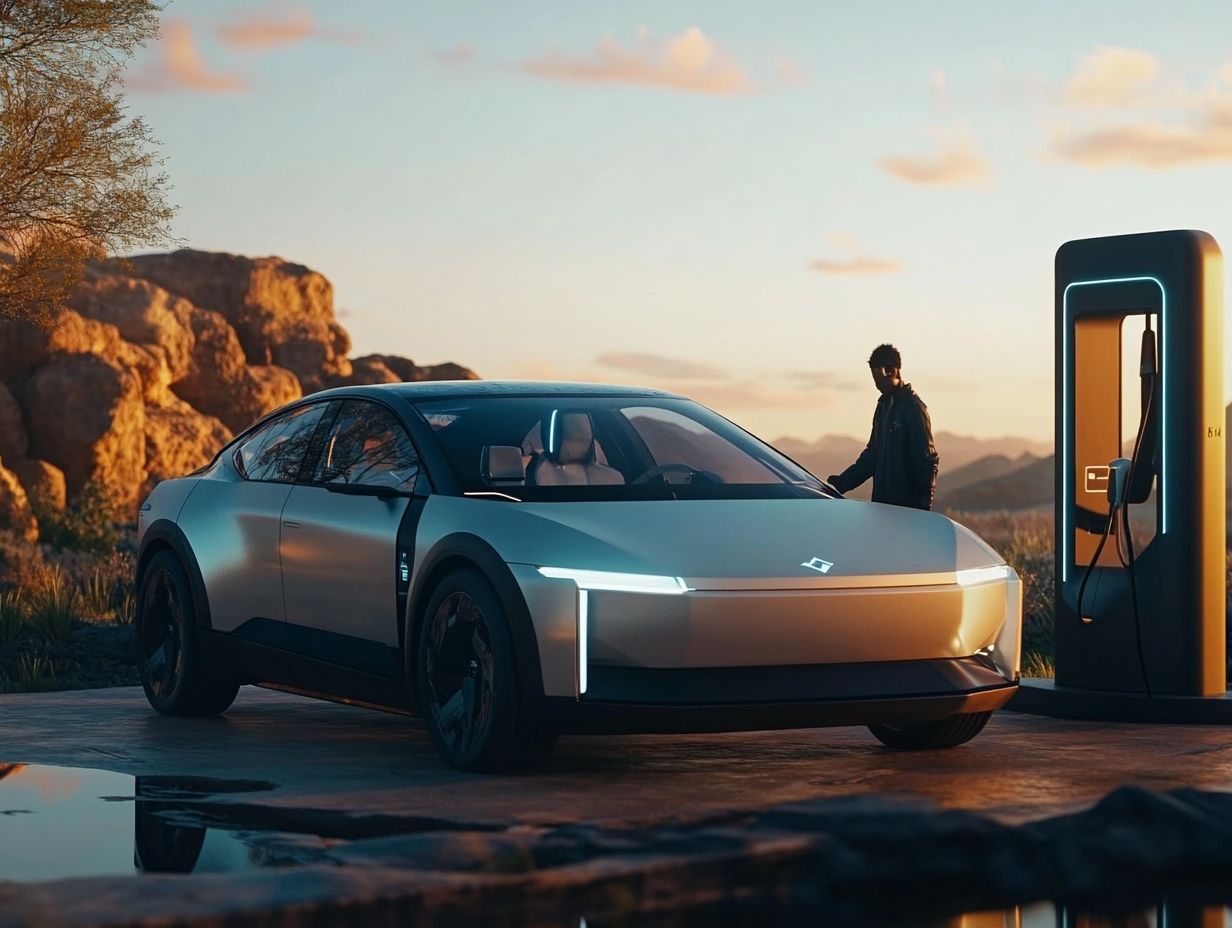
When you’re considering an electric car, assess key safety features. Advanced driver assistance systems are especially important, along with understanding the 67. 5 reasons to choose an electric family car.
These systems include cutting-edge technologies like:
- Automatic emergency braking
- Lane departure warnings
- Adaptive cruise control (this adjusts your speed based on the car ahead)
Each feature boosts your awareness on the road and reduces accident risk. By understanding these features, you empower yourself to make safer choices.
Find reliable safety ratings on platforms like the Insurance Institute for Highway Safety. These resources help you compare models and evaluate crash test performances.
How Does the Technology and Connectivity of Electric Cars Compare to Traditional Cars?
The technology in electric cars often surpasses traditional vehicles. You get advanced feedback systems and innovative infotainment that enhance your drive.
These features create a user-friendly interface, allowing easy access to navigation and music without distractions. Many electric models now come with touchscreens and voice recognition to keep your focus on the road.
Over-the-air updates keep your software current. This means improvements and new features are available long after your purchase.
What Are Some Comfort and Convenience Features to Consider in an Electric Car?
Consider electric cars for their eco-friendly designs! You ll find intuitive interfaces and automated functions that make driving a breeze.
These vehicles provide spacious interiors with generous legroom and cargo space, perfect for families and adventures. Advanced technology systems make navigation effortless so you can concentrate on your drive.
Sustainable materials not only help the planet but also create a luxurious cabin atmosphere. Together, these elements enhance your overall driving experience.
Is the Cost of an Electric Car Worth It in the Long Run?
Evaluating whether the cost of an electric car is worth it in the long run requires careful analysis of ownership costs, potential savings from government incentives, and expected resale value in a constantly evolving market.
A detailed breakdown of the financial aspects reveals that while the initial purchase price of an electric vehicle may exceed that of a traditional car, substantial savings on fuel and maintenance are often enjoyed over time.
Many regions offer attractive government incentives that can significantly reduce initial costs, enhancing the appeal of these vehicles for discerning buyers like you.
It’s crucial to consider how the anticipated resale value of electric cars could change as technology advances. With growing consumer interest and an expanding market, these vehicles may retain their value better than their gasoline counterparts, making them a smart investment for the future.
Frequently Asked Questions
What are the 7 key features to look for in an electric car?
The 7 key features to look for in an electric car are range, charging time, battery size, performance, safety features, connectivity options, and price.
Why is range an important feature to consider in an electric car?
Range refers to how far an electric car can travel on a single charge. It is an important feature as it determines your driving distance before needing to recharge, crucial for longer trips or commutes.
How does charging time affect the usability of an electric car?
Charging time is how long it takes to recharge an electric car’s battery. Longer charging times mean more waiting, which can limit daily usability.
What is the significance of battery size in an electric car?
Battery size indicates the capacity of the car’s battery and affects both range and performance. A larger battery typically allows for a longer range and better performance, but it usually comes with a higher cost.
How do performance and safety features differ in an electric car compared to a traditional car?
Performance and safety features can differ due to the different power sources. For example, electric cars provide instant power and unique braking systems, while traditional cars may have various engine options and fuel efficiency ratings.
What type of connectivity options should I look for in an electric car?
Connectivity options can include built-in navigation, remote access through a mobile app, and compatibility with voice commands. These features enhance your overall experience and add convenience.
Is the price of an electric car a key feature to consider?
Yes, the price of an electric car is an important factor. While they may have lower operating costs, they tend to have a higher upfront price compared to traditional cars. Knowing your budget can help you make a smart choice!
Don’t miss out on the benefits of driving an electric car it’s a step towards a sustainable future! Explore your options today for a greener tomorrow!


